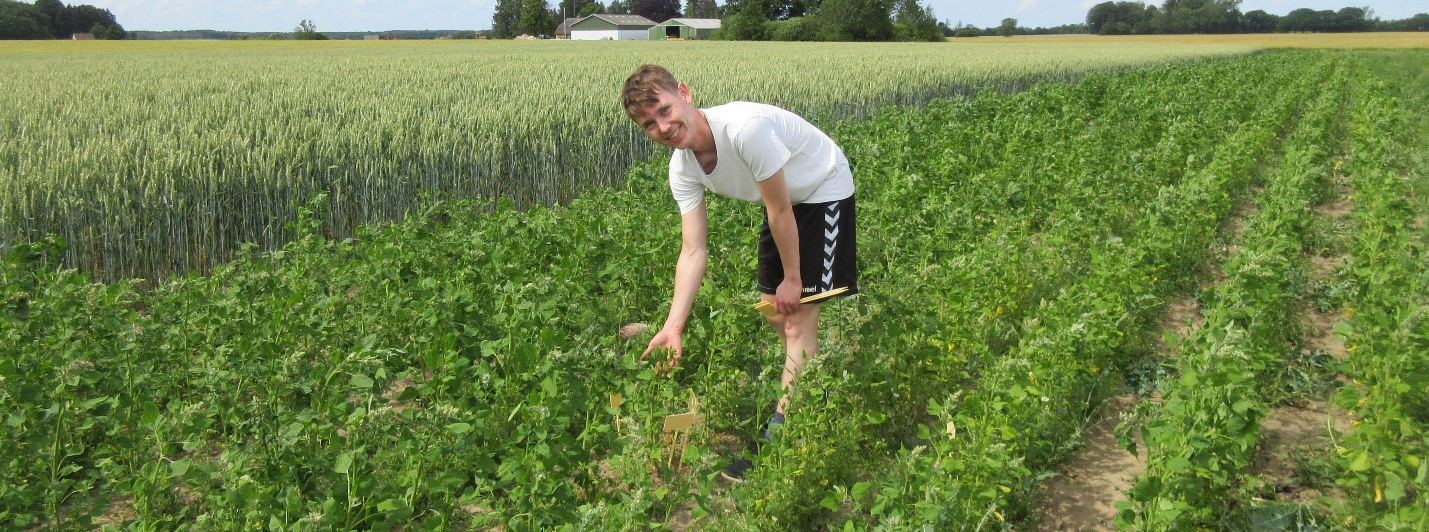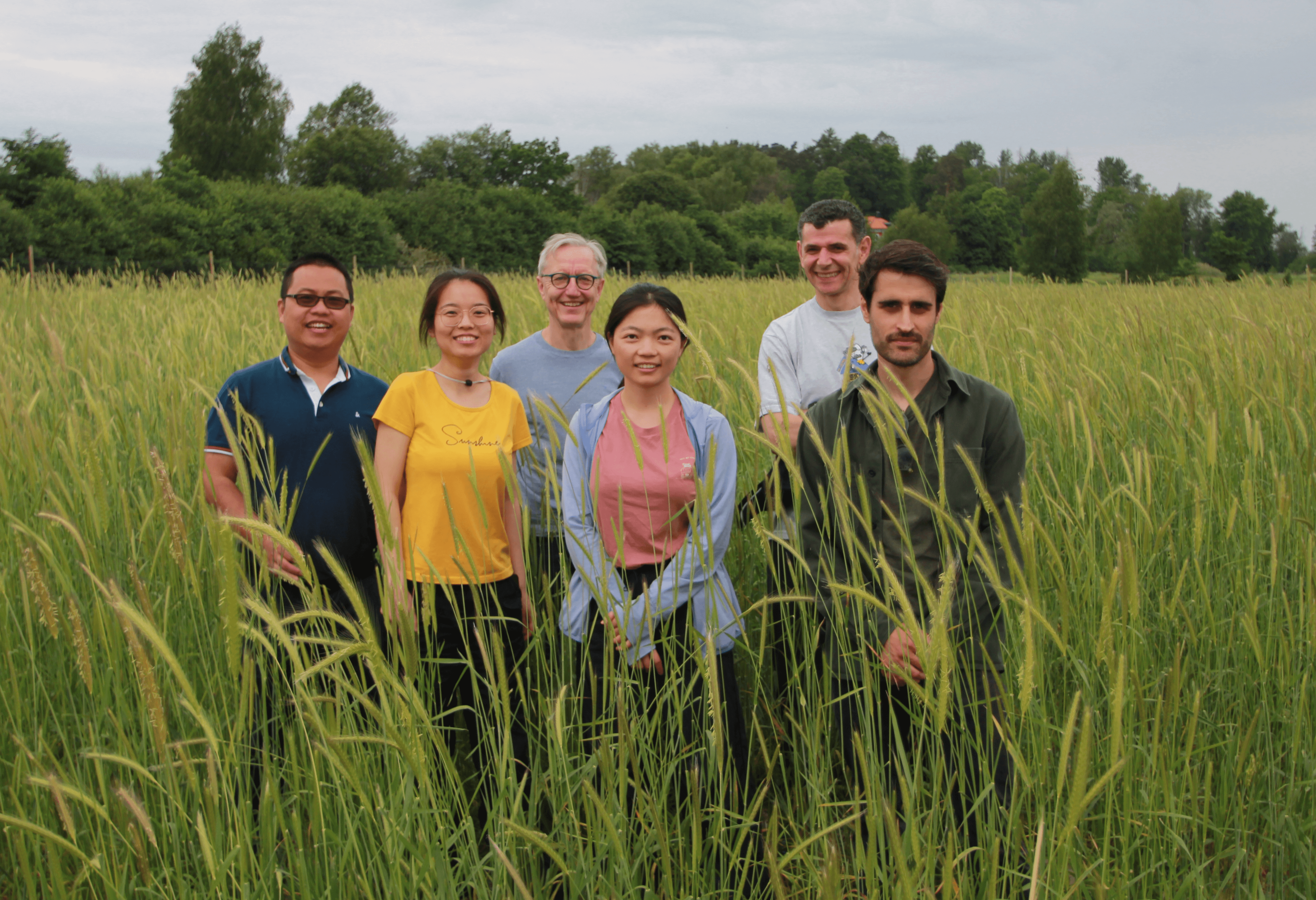Exploring P-type Pumps and Novel Crops

By comparison, there are about 380,000 wild plant species, many of which tolerate even the most challenging conditions. Nature therefore offers us tremendous genetic variation that could hold the key to ensuring food security. Instead of investigating how to make our current crops more robust, our research addresses how to transform underutilized plants that are already resilient into new crops. Our focus is on the perennial grass intermediate wheatgrass, an emerging grain crop; barley, a model grain crop; and the drought and salt stress-resilient plant quinoa.

In another line of research, we study the structure, function and regulation of pumps that mediate primary active transport across membranes, particularly P-type ATPase pumps, which form a large superfamily in all forms of life. P-type ATPases pump cations (like essential metals, calcium and protons) and phospholipids across membranes. Well-characterized members are essential for many basic functions in cells and we aim to assign physiological functions to less-characterized pumps. All members of this family form a phosphorylated reaction cycle intermediate, hence the name P-type, and their diversity raises questions, such as how electrogenic pumps evolved, that we are trying to answer. We are also investigating the pumping mechanism and regulation of these biological nanomachines. Answering these questions will help us understand how primary active transport processes control nutrient uptake and allocation in plants.
-
Intermediate wheatgrass: A future grain crop
Annual grain crops currently provide approximately 70 percent of human calorie requirements, and occupy 70 percent of cropland worldwide. Annual crops must be sown every year, which disturbs the soil and exposes it to erosion through tillage or clearing of vegetation with herbicides. In addition, young seedlings with shallow root systems are inefficient at taking up water and nutrients, which is a major cause of ground and surface water pollution by nitrate leaching. A perennial grain crop that does not need to be sown every year would develop a deep and long-lived root system that sequesters carbon and takes up nutrients and water more efficiently. Such a crop would be tolerant to a wide array of stresses. We aim to accelerate domestication of the perennial grass wheatgrass (Thinopyrum intermedium), a close relative of annual wheat. As T. intermedium lacks key domestication traits, the genes responsible for several traits must be modified before T. intermedium grains can be produced at large scale. These genes include those that control grain size and number, plant height, free threshing and rachis development. To accelerate the domestication process, from thousands of years (as it took for wheat) to hopefully less than a decade, we are inducing mutations in genes related to key domestication genes in wheat, barley and rice.
Contact :
Guangbin Luo g.luo@plen.ku.dk
Pedro Miguel Pereira Correia pc@plen.ku.dkJavad Najafi jn@plen.ku.dk
Margrethe Kristine Dam Falkenberg margrethe@plen.ku.dk -
Improving barley by promoting P-type ATPase activity
P-type ATPases are membrane pumps that are of crucial importance for life in all kingdoms. In plants, they regulate nutrient uptake, signal transduction, reproduction and growth through pumping ions and lipids across biological membranes. P-type ATPase activity and thus also plant growth are controlled by multiple external factors. We aim to identify and characterize P-type ATPases in barley (especially members of the P1B and P3 ATPase subfamilies) and design and examine plants carrying gain-of-function mutations in these pumps. Our LESSISMORE project partner—Carlsberg Research Laboratory—has established a high-throughput technique to screen for specific genetic variation in libraries of hundreds of thousands barley plants. We have designed and generated gain-of-function mutants expressing constitutively active P-type ATPase pumps. We are investigating how such modifications influence yield and stress tolerance.
Contact:
Anton Frisgaard Nørrevang afn@plen.ku.dk -
Understanding the extreme hardiness of the super crop quinoa
We aim to decipher the molecular mechanisms of water stress tolerance in plants and generate a knowledge base and methods platforms for future breeding of drought-tolerant crops. Quinoa (Chenopodium quinoa), a pseudocereal crop that is tolerant to multiple water-related stresses, will be the focus of this project. This plant can grow on marginal soils under extreme salt and water stress and the seed has exceptional nutritional qualities. Although quinoa has yet to reach its potential as a fully domesticated crop, breeding efforts to improve the plant have been limited. Molecular and genetic techniques combined with traditional breeding are likely to change this picture. We have analyzed protein-coding sequences in the quinoa genome that are orthologous to domestication genes in established crops. Altering by targeted mutagenesis only a limited number of such genes that control e.g. grain size and nutritional quality may be a promising route for accelerating the improvement of quinoa and generating a nutritious high-yielding crop that can meet the future demand for food production in a changing climate.
Contact:
Luu Trinh mdlt@plen.ku.dk
Anton Frisgaard Nørrevang afn@plen.ku.dk
Max William Moog mwm@plen.ku.dk
Amalie Kofoed Bendtsen amalie-kb@plen.ku.dk
-
H. bulbosum: a new climate-friendly market-competitive perennial barley
-
Perennial grasses live for several years and have a deep and long-lasting root system that binds large amounts of carbon. However, these plants have not yet been domesticated and their yields are much lower than those of annuals. Perennial grasses are superior at using mineral nutrients efficiently, improving soil health, and tolerating abiotic stresses, such as drought. A transition to cropping systems based on perennial cereals, rather than annuals, would increase carbon storage and be a major step towards both a more climate-friendly and climate-resilient agriculture. In this project, we will strive to domesticate a wild perennial relative of barley, Hordeum bulbosum, as a novel climate-smart carbon source for food and feed industries. Based on H. bulbosum populations already selected for growth in Scandinavia under farmer field conditions, the project will aim to increase their productivity and in this way generate a new climate-friendly market-competitive perennial barley.
Contact :
Guangbin Luo g.luo@plen.ku.dk
Pedro Miguel Pereira Correia pc@plen.ku.dk
Javad Najafi jn@plen.ku.dk
Margrethe Kristine Dam Falkenberg margrethe@plen.ku.d
- DEEPROOTS - Future research into the developent of high-yielding perennial grasses that bind carbon in the soil
- RaisingQuinoa: Carlsbergfonden
- NovoCrops: Novo Nordisk Fonden
- PERENNIAL: Accelerating the domestication of a novel perennial climate-smart barley
- Editing by Grafting: Advancing transgene-free genome editing in grain cereal crops via grafting
Villum Experiment to Pedro Correia (2023-2025)
We were the first to
- elucidate the phylogenetic relationships among P-type ATPase pumps and named the families in the current classification system.
- identify the regulatory domains of the P-type plant plasma membrane H+-ATPase and several proteins and compounds acting via this domain (e.g. lyso-PC, 14-3-3 protein, PKS5, SCaBP1, PP2A, PSY1R).
- elucidate the mechanism of transport for plasma membrane H+-ATPase, which involved developing the first heterologous expression system for pumps, identifying the ion binding sites, and collaborating to obtain a crystal structure of the plasma membrane H+-ATPase.
- clone a plant plasma membrane Ca2+-ATPase, identify the N-terminal regulatory domain of this pump and collaborated to obtain the crystal structure of this domain in complex with calmodulin.
- identify and characterize plant P4 ATPases and their β-subunits as lipid flippases
- identify P5 ATPases as a new family of eukaryotic P-type ATPases.
Moog MW, Trinh MDL et al. et Wendt T, Palmgren M (2022) New Phytologist 236: 1409-1421.
Luo G, Najafi J et al. et DeHaan L, Palmgren M (2022) Plant and Cell Physiology 63: 1624-1640.
Hayashi M, Palmgren M (2021) The quest for the central players governing pollen tube growth and guidance. Plant Physiology 185: 682-693.
López-Marqués RL, Davis JA, Harper JF, Palmgren M (2021) Dynamic membranes: the multiple roles of P4 and P5 ATPases. Plant Physiology 185: 619-631.
Luo G, Palmgren M (2021) GRF-GIF chimeras boost plant regeneration. Trends in Plant Science 26: 201-204.
DeHaan L, Larson S, López-Marqués RL, Wenkel S, Gao C, Palmgren M (2020) Roadmap for accelerated domestication of an emerging perennial grain crop. Trends in Plant Science 25: 525-537.
Hoffmann RD, Portes MT, Olsen LI, Damineli DSC, Hayashi M, Nunes CO, Pedersen JT, Lima PT, Campos C, Feijó JA, Palmgren M (2020) Plasma membrane H+-ATPases sustain pollen tube growth and fertilization. Nature Communications 11: 2395.
López-Marqués RL, Nørrevang AF, Ache P, Moog M, Visintainer D, Wendt T, Østerberg JT, Dockter C, Jørgensen ME, Salvador AT, Hedrich R, Gao C, Jacobsen S-E, Shabala S, Palmgren M (2020) Prospects for accelerated improvement of the resilient crop quinoa. Journal of Experimental Botany 71: 5333-5347.
Palmgren M, Sørensena DM, Hallströmc BM, Sälld T and Broberg K (2020) Evolution of P2A and P5A ATPases: ancient gene duplications and the red algal connection to green plants revisited. Physiologia Plantarum 168: 630–647.
Zhang Y, Palmgren M (2020) Gene-editing in plants no longer requires tissue culture. Front. Agr. Sci. Eng. 7(2): 229–230.
Zhang Y, Pribil M, Palmgren M, Gao C (2020) A CRISPR way for accelerating improvement of food crops. Nature Food 1: 200-205.
Group members
| Name | Title | Phone | |
|---|---|---|---|
| Anton Frisgaard Nørrevang | Postdoc | ||
| Guangbin Luo | Assistant Professor | +4535332099 | |
| Jinhua Lin | Enrolled PhD Student | ||
| Mai Duy Luu Trinh | Assistant Professor | +4535332362 | |
| Margrethe Kristine Dam Falkenberg | PhD Fellow | ||
| Max William Moog | Postdoc | +4535326667 | |
| Mengming Chen | PhD Fellow | +4535331741 | |
| Michael Broberg Palmgren | Professor | +4535332592 | |
| Pedro Miguel Pereira Correia | Assistant Professor | ||
| Xinyi Dong | PhD Fellow | +4535335776 | |
| Xu Zhai | Special Consultant | +4535324143 |
Master's students
- Weizheng Tan
- Zinyan Zhou
- Thora Kjærsgaard
Erasmus students
- Maria Perez Malheiro

